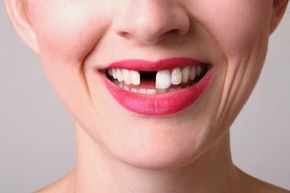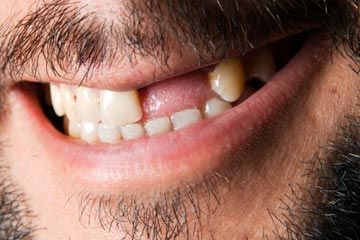Replacing a tooth that's been lost or pulled due to damage, decay or disease isn't an overnight process. When a tooth is removed, the gums and underlying bone usually need anywhere from six weeks to six months to heal before you can get a long-term fix, depending on the replacement method you choose [source: Mayo Clinic]. This is because tooth loss naturally causes a change in the shape of the gums and bone support structure in the jaw, which affects the fitting of permanent dentures and dental implants.
This is where flipper teeth come in. Also called "flippers," flipper teeth are lightweight, removable dentures that usually serve as a temporary tooth replacement option. Basically, they keep you from having to walk around with a visible gap in your teeth for several weeks. They also give you an improved ability to bite and chew food while you're waiting to get dentures or implants.
Advertisement
Using a temporary device like a flipper can have some further-reaching beneficial effects on your oral health, too. Wearing flippers can help diminish bone loss in the initial three to four months after you lose a tooth, which is the time when bone deterioration is most drastic [source: Goiato]. It also prevents any shifting of teeth around a gap [source: McKinney]. Additionally, flipper teeth help protect the wounds on the site of lost or extracted teeth and aid in healing [source: Goiato].
Flipper teeth are made mostly of acrylic resin, unlike cast-metal partial dentures, which are relatively inexpensive, long-term teeth replacements with foundations made of a metal and plastic mix. Similar to a retainer, flippers stay put in your mouth with the help of two steel wire clasps that wrap around two of your natural teeth. The false teeth used in flippers are made of plastic or porcelain, much like those used in more expensive, permanent replacement methods.
Many dental patients consider flipper teeth to be more comfortable and aesthetically appealing than cast partials that are made of metal, and they're also easier to get used to since they're not as rigid. Additionally, it takes less time to form and fit flippers than a cast metal partial due to the materials used. As a temporary fix, flippers are often the least expensive option for a person waiting for permanent dentures or implants.
When possible, dental professionals fabricate flippers before removing your teeth, so you can put them in as soon as your natural teeth are gone. Once fitted, a flipper can easily accommodate further tooth loss through a simple alteration of the original appliance.
Does the flexible functionality of flipper teeth make them a potential permanent tooth replacement solution? Read the next page to find out.
Advertisement


